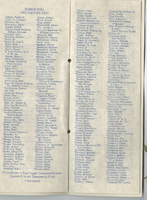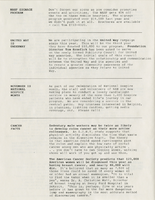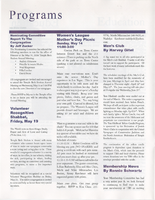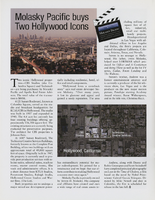Search the Special Collections and Archives Portal
Search Results
Adelson, Merv
Mervyn L. "Merv" Adelson (1929- ) is a co-founder of Lorimar Telepictures Corporation and a former Las Vegas, Nevada real estate developer. Adelson founded Paradise Development Company with Moe Dalitz, Irwin Molasky, and Allard Roen in Las Vegas in 1951. The partners built Sunrise Hospital, Boulevard Mall, residential neighborhoods, and several buildings for the University of Nevada, Las Vegas. When Adelson's father died of cancer in 1978, he and Molasky decided to build Nathan Adelson Hospice in his honor.
Person

Transcript of interview with Beth Molasky by David Shwartz, June 2, 2014
Date
Archival Collection
Description
In this interview, Molasky discusses her parents, Irwin and Susan Molasky, and growing up in Las Vegas as a member of Temple Beth Sholom. She attended Sunday school and Hebrew school, but is not particularly religious as an adult.
Beth Molasky-Cornell is a partner, shareholder, and an active member of the board of directors of the Molasky Group of Companies, which was founded by her father Irwin Molasky. She is a founding partner and a core member of the board of directors of Ocean Pacific Companies, a high-end real estate development firm founded by her husband Ken Cornell in San Diego, California. Molasky-Cornell contributed to numerous Molasky Group building projects, including the Bank of America Plazas, the Winterwood Corporation land development, and the Park Towers luxury condominiums. Molasky was born in Florida; however, her family moved to Las Vegas before her second birthday. She graduated from Valley High School in 1968, and started college at the University of Southern California at the age of seventeen. After spending a couple of years in Rhode Island, where she had her children, she moved back to Las Vegas in 1975. In this interview, Molasky discusses her childhood experiences in Las Vegas, especially as a member of the Jewish community, and reflects upon changes that influenced her children?s upbringing in the city.
Text

LVCJA Ball programs and planning documents, item 02
Description
Program for the Silver Anniversary Ambassador's Ball at Caesars Palace in Las Vegas, Nevada.

Transcript of interview with Wilma and Burt Bass by Barbara Tabach, February 9 , 2015
Date
Archival Collection
Description
In 1939, Wilma (Frank) Bass was born in New York City, where she began her involvement in theater at the age of ten. Almost twenty years later, she met Burt Bass (1932- ) when both worked for a photography studio, one of Burt first post-high school jobs. Burt opened his first professional photography studio in 1962, shortly after he married Wilma in 1960. The couple soon had two daughters – Jill and Wendy – and moved to Las Vegas in 1974. Burt initially worked for his brother-in-law Ed Frank's check cashing businesses and later opened his own photography business, Burton Studio. He later added services such as fingerprinting, background checks, and photographs for identification cards. Wilma worked as a jewelry salesperson, first at the Gold Factory then at Nieman Marcus. Socially, she was very involved with Temple Beth Sholom’s Sisterhood, using her theater talents to write, direct and produce various shows for the Sisterhood, ORT as well as B’nai B’rith Youth Organization. In this interview, Burt discusses his photography business, the migration of its storefront around town, and his colorful landlords, including individuals like Moe Dalitz and Art Marshall. Wilma talks about her sales career in the local jewelry industry, and more extensively, she shares memories of her involvement in the Jewish community with theater productions. Much of the discussion revolved around related news articles and personal photos from their relationships and activities within the Jewish community. The couple also shares stories of friendships with local entertainers, including Jerry Lewis and Neil Sedaka.
Text

Transcript of interview with Hank Gordon by Claytee D. White and Stefani Evans, October 26, 2016
Date
Archival Collection
Description
As we go about our days, running errands and getting things for our households, we often don’t think too much of the story behind the commercial real estate and retail stores we frequent. Only when those stores aren’t there and the neighborhood demographic changes do we embrace the nostalgia that goes into the story of the neighborhoods where we live and shop. Hank Gordon is the man behind those memories of those shopping centers we frequent not only in the Las Vegas Valley, but in Washington, Oregon, Montana, California and Alaska as well. Gordon was raised in Los Angeles and graduated from USC in 1956, when he went to work for a home builder in the San Fernando Valley selling his houses to make some extra weekend money. It was during this time he fell in love with real estate and had to break the news to his parents that he no longer was going to be a doctor. Feeling the urge of leadership he told his mentor that he didn’t want to sell houses-he wanted to develop homes instead. Shortly after that he bought a subdivision of lots in Van Nuys and started building 7-11 and Goodyear stores in the early 1960s. In this interview, Gordon talks about building his first shopping center in 1967 and moving to the Pacific Northwest. He moved to Las Vegas in 1988, when he bought 23 new national retailers to the Valley. He was responsible for bring Home Depot in 1999 and Costco and Best Buy to some of Las Vegas’s longest-standing shopping centers; Best of the Boulevard on Maryland Parkway and Best of the West on Rainbow Boulevard. He speaks of the changes to the market after the Great Recession, how retailers are having a hard time keeping afloat because of online shopping, and his days on the planning commission for the City of Las Vegas during the 1990s, when Jan Jones was mayor. It is without a doubt that Hank Gordon is one of the best in the business and there isn’t a lot of competition at the top.
Text




